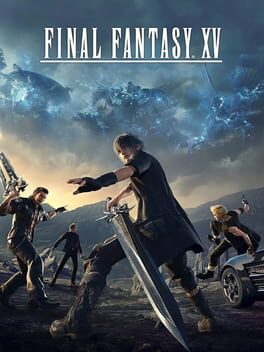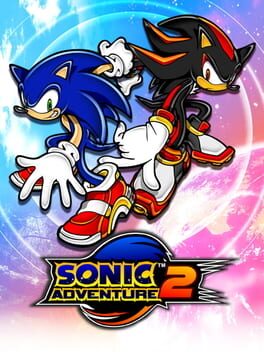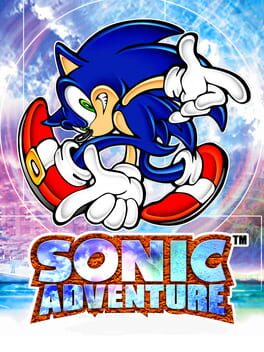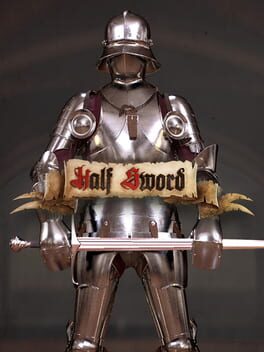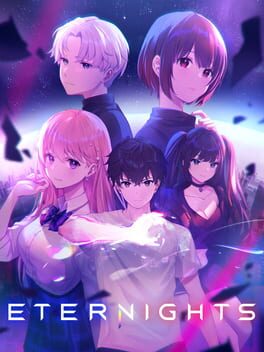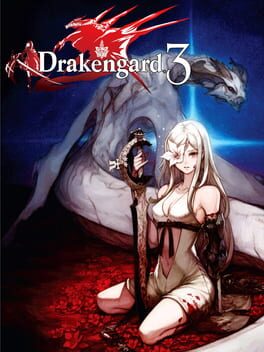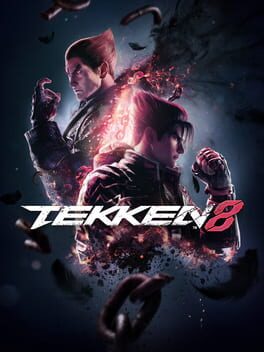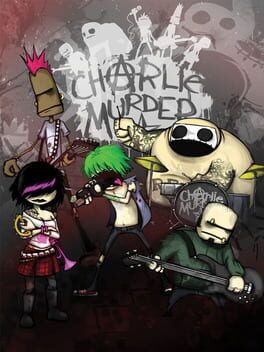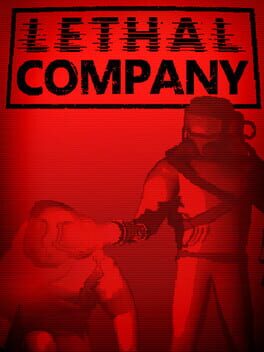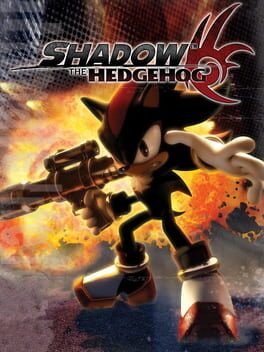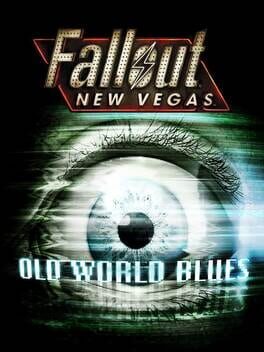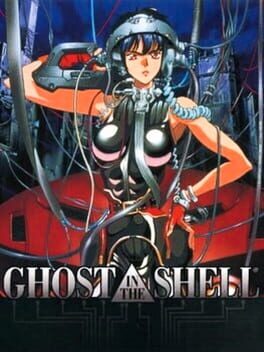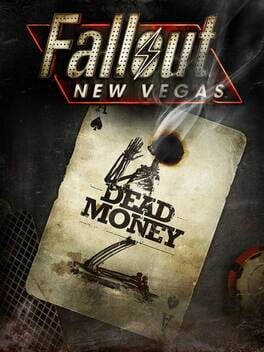straylight
2016
A Final Fantasy for fans and first timers indeed: Final Fantasy XV is for everyone, and as a result Final Fantasy XV is for absolutely no one.
Between Square Enix's struggle to acclimate to the development process of seventh-gen hardware, the tumultuous state of the company in the early 2010s, and the Fabula Nova Crystallis brand's hard focus on the mainline Final Fantasy XIII trilogy, Final Fantasy Versus XIII was a game that was impossible to make. Ten years after its inception, Square Enix instead settled on making Final Fantasy XV the only game that any big-name corporation could ever possibly make in the climate of the 2010s game industry.
I admire and respect people's desire to find meaning and personal resonance in what was eventually delivered in Final Fantasy XV - everybody has their slop of choice, and the Heavens above know I am not exempt - but I feel that much of the most generous readings of the game fail to see it for what it is: a recurring trend in the majority of interviews with Hajime Tabata indicate that he was first and foremost interested in creating a game that would be as accessible as possible, reach as wide of an audience as possible, and - naturally, by necessity - sell well. Edges were filed off, idiosyncracy and personal touches were traded for easily-digestible variations on what had become popular in the industry and culture around video games by the point of its rebirth: vacuous and empty open worlds devoid of life beyond their skin-deep beauty. Shallow bonds between shallow characters, the lowest-common-denominator appeal of spending time with the boys or the obvious potential for the yaoi fan demographic masking the blatant misogyny at the core of the script. Entire vertical slices of necessary information and storytelling being absent, surgically removed to be sold back to the player through films, animated adaptations and predatory DLC models. Brand names and corporate sponsorships peppered throughout, to anchor the game to its consumerist ideals and destroy any hope of denying what it is: while all video games are inherently products and thus are necessarily burdened by some degree of cynicism, the recurring inclusion of brand names by Coleman, Nissin, and American Express act a stark reminder that Final Fantasy XV has been accepted by and joined the ranks of its contemporaries as something made to be marketed and sold. Consider that the expanded Final Fantasy XV universe was cancelled and left by the wayside by the higher-ups at Square Enix, while the pay-to-win mobile game still persists to this very day.
Many will vehemently defend Final Fantasy XV's flaws as unsightly bumps on a more coherent whole, or even defend its flaws as purposeful barbs and thorns on the surface of a carefully-cultivated masterwork. To one extent or another, I can't help but agree: Final Fantasy XV is bad on purpose. However, it was not bad on purpose to prove a point or make some grand artistic statement. Final Fantasy XV is bad on purpose because its audience has spoken, and the industry has no choice but to answer: this is what it means to be a Video Game in the Modern Era. This is what sells. This is what you and I have asked for, and this is what you and I must live with.
I don't know if we necessarily deserve better than Final Fantasy XV, but I do certainly believe that we would all be better off in a world in which we did not allow a game like Final Fantasy XV to become what studios and corporations correctly presume is what audiences are asking for.
Between Square Enix's struggle to acclimate to the development process of seventh-gen hardware, the tumultuous state of the company in the early 2010s, and the Fabula Nova Crystallis brand's hard focus on the mainline Final Fantasy XIII trilogy, Final Fantasy Versus XIII was a game that was impossible to make. Ten years after its inception, Square Enix instead settled on making Final Fantasy XV the only game that any big-name corporation could ever possibly make in the climate of the 2010s game industry.
I admire and respect people's desire to find meaning and personal resonance in what was eventually delivered in Final Fantasy XV - everybody has their slop of choice, and the Heavens above know I am not exempt - but I feel that much of the most generous readings of the game fail to see it for what it is: a recurring trend in the majority of interviews with Hajime Tabata indicate that he was first and foremost interested in creating a game that would be as accessible as possible, reach as wide of an audience as possible, and - naturally, by necessity - sell well. Edges were filed off, idiosyncracy and personal touches were traded for easily-digestible variations on what had become popular in the industry and culture around video games by the point of its rebirth: vacuous and empty open worlds devoid of life beyond their skin-deep beauty. Shallow bonds between shallow characters, the lowest-common-denominator appeal of spending time with the boys or the obvious potential for the yaoi fan demographic masking the blatant misogyny at the core of the script. Entire vertical slices of necessary information and storytelling being absent, surgically removed to be sold back to the player through films, animated adaptations and predatory DLC models. Brand names and corporate sponsorships peppered throughout, to anchor the game to its consumerist ideals and destroy any hope of denying what it is: while all video games are inherently products and thus are necessarily burdened by some degree of cynicism, the recurring inclusion of brand names by Coleman, Nissin, and American Express act a stark reminder that Final Fantasy XV has been accepted by and joined the ranks of its contemporaries as something made to be marketed and sold. Consider that the expanded Final Fantasy XV universe was cancelled and left by the wayside by the higher-ups at Square Enix, while the pay-to-win mobile game still persists to this very day.
Many will vehemently defend Final Fantasy XV's flaws as unsightly bumps on a more coherent whole, or even defend its flaws as purposeful barbs and thorns on the surface of a carefully-cultivated masterwork. To one extent or another, I can't help but agree: Final Fantasy XV is bad on purpose. However, it was not bad on purpose to prove a point or make some grand artistic statement. Final Fantasy XV is bad on purpose because its audience has spoken, and the industry has no choice but to answer: this is what it means to be a Video Game in the Modern Era. This is what sells. This is what you and I have asked for, and this is what you and I must live with.
I don't know if we necessarily deserve better than Final Fantasy XV, but I do certainly believe that we would all be better off in a world in which we did not allow a game like Final Fantasy XV to become what studios and corporations correctly presume is what audiences are asking for.
2001
"oh but the speed stages are too easy and badly designed and control poorly"
"oh but the shooting stages are slower than in sonic adventure 1"
"the treasure hunting stages are lackluster and underdeveloped in comparison to the other two kinds of missions at best, and overly convoluted and artificially difficult at worst"
you know, in my quest to 100% this game for the first time in my 22-year sonic adventure 2 career, i was worried i'd ruined the magic of the game for myself. mastering this game is grueling, man. it's one of the most tedious, difficult, and demanding collect-a-thons ever made, and after a certain point the cracks in the foundation of the basic game design begins to show as sonic adventure 2 begins to burst under the weight of its own ambition. there are only so many times you can handle playing the same set of missions over the same set of levels clearly not designed around them before you start to feel a little wearied, you feel me?
but i think my saving grace was the fact that i opted to gather all of the mission emblems before i actually completed the main story. after getting every A-rank from city escape all the way to final chase, i strapped right back in to the last story and let it enfold me. it's kind of funny how a lot of the things i cherished heavily at one point due to nostalgia vision and their impact on me lose their luster when i revisit them - sonic adventure 1 itself isn't immune to this, nor are other contemporary classics like half-life 2 or the original bioshock that were equally impactful on me - but nope, sonic adventure 2 still makes me feel like i'm standing on the fucking ceiling every time i strap in and let the main campaign take me. i mean, sure, the game is strongest as a 5-hour tour de force where it can showcase the strengths of its perfected gameplay loops without having to stretch them thin over a bevy of tasks not suited to them, and a few of the levels actively work against what the game's mission statement is... but what does any of that matter in the long run when sonic adventure 2 is simply the coolest game ever made?
by june 2001, the writing wasn't even on the wall anymore - the wall had actively been blown the fuck down by a monolithic black juggernaut sent by sony to wipe the floor with any and all competitors. the dreamcast had already been discontinued in march after a less-than-three-year lifespan, and with sega's transition into exclusively third-party software development the future of the company and its individual identity was cast into utmost obfuscation. it would be all too easy to just bow your head and duck out quietly here, but sonic team didn't seem content to just sit there and take it. if they were gonna sink, they must have planned on going down with the ship, because sonic adventure 2 is a masterclass in confidence - narratively and mechanically this is the best game that they ever made, and it knows it.
i think i could make an easy case for sonic adventure 2's complexity and depth if i compared it to devil may cry 3 (a game which has a lot of story and stylistic parallels to sonic adventure 2 as well... hmmmm): it's easy to waffle your way through each level and just keep going after you stumble, keeping a skill ceiling just low enough that you don't drown in the insane amount of shit going on... but part of the reason why sonic adventure 2 has such a reputation for its insane 100% status is because playing sonic adventure 2 well takes a lot of skill, practice, and willingness to learn. between the points system actively rewarding stylish gameplay and optimizing the living hell out of every second of your run, the fact that even one mess-up can potentially mean a restart, be it due to failing to maximize your point accumilation or (even worse) dying and starting with 0 points from whatever checkpoint you'd hit before that point. granted, many of the missions actively work against this design philosophy (especially since the same set of 5 missions is copy-and-pasted onto probably 95% of the stages, regardless of genre or level design), but when it hits? you get what you put into it. i've been eking away at sonic frontiers for the past sixth months or so, and it's perpetually perplexing to me that they apparently still don't know how to make sonic control well when they got it right twenty-three years ago. i'm starting to think we'll never get platforming levels like metal harbor or final chase ever again, or even the utterly deranged examples set by cosmic wall and mad space...
all right. sit the fuck down with your jututsu kaisens and your chainsaw mans and your my hero academias. bleach? one piece? dragon ball z? hell, fucking full metal alchemist (the indisputable GOAT in my opinion)? you all take notes too. this is the real shit, motherfuckers. REAL SHOUNEN. all killer, no filler. a series of picture-perfect Moments flawlessly interwoven together with just enough internal rhyme and reason to convince you to Go With It and not think about it too hard, all while having enough genuine substance and things to say for its children-and-teens audience to chew on. there's a reason that you hear people recite basically every cutscene in this game word for word during GDQ runs: everything from the iconic jungle clash between sonic and shadow to the mundane little moments like amy, knuckles and tails chilling on the side of the road just ooze style and personality, even when the story at hand is so boneheaded and numbskulled that you can't really get much out of it besides the raw adrenaline pumping through your veins. i even think the weird mo-cap on the anthro actors gives everything a lot of personality and charm, if only because this is the only time that sonic and co have felt like real people and genuine action heroes to me: it's little things like sonic assuming a cool guy fighting pose when he's about to square up with eggman, or the sheer cuntiness in rouge dangling above the eclipse cannon when introducing herself to eggman and shadow. sonic has always sort of had this reputation as being a silly scrimblo bimblo cartoon series, and it is that, but for one brilliant moment of clarity it commits to the bit and makes sonic actually as cool as he purports to be... and he's got enough swag that it actively rubs off on everyone and anything around him.
of course, this is maybe sonic the hedgehog's most controversial foray into genuine pathos... but i think everybody hams up the perceived "edginess" at the heart of the game without considering whether or not it's all in service of what the game ultimately has to say. sega knew that this would likely be their swan song, and the introspection and reflection littered throughout the script and reflection reflect that perfectly: sega was going out with a whimper after exploding onto the game scene with a bang, and the sort of questions the story poses reflects that perfectly. what happens when you're not who you thought you were, or when the people you define yourself by aren't who they thought you to be? the consistent anti-authoritarian throughline (sonic adventure 2 is an explicitly anti-police and anti-military game, and i'm not exaggerating even a little) reflects a willingness to distrust that which is portrayed as the unambiguous and untouchable good within our society. eggman's idolization of his grandfather is broken when he beholds dr. gerald's descent into wickedness, perhaps coming to understand his own lust for power and control as something less than the true tragic evil that now lives on through the blood in his veins. rouge's loyalty eventually yields not to her government benefactors or to her own selfish desires, but to her endearment to knuckles - an act which seems to even surprise herself by the end. hell, tails actually manages to make good on his "being independent from sonic" character arc from the previous game, considering that he breaks free from the mold of being a simple sidekick and is probably the single largest driving factor in the hero storyline from the moment sonic gets arrested for a second time.
last but most CERTAINLY not least, shadow the hedgehog's obfuscated memories and trauma-laden motivations all act to obscure and suppress the genuine kind heart and noble intentions he was born with and made for, perhaps being the embodiment of the game's study of and statements against the very concept of dualism. you would think that sonic's comparative lack of depth would make him stick out like a sore thumb here, but if anything i think this is the one and only example of that one-note characterization working to his favor: sonic simply is who he is, and his acceptance of his simple nature allows him to be who he is effortlessly without any kind of cognitive dissonance or baggage keeping him burdened to the past or anchored to laments about his present. he holds himself to no particular moral standard or self-image save for doing what he simply feels is appropriate at any given moment, his need for self-indulgence and going with his heart mercifully counter-balanced by the inherent purity of his character. shadow yields the title of "ultimate life form" to sonic not out of a recognition of his physical power or infalliability as a person, but because sonic's ideology is simply the way to be: unapologetically, violently, proudly yourself, unfettered to the artificial molds arbitrated your society, your past, or even your own everyday insecurities.
when i say sonic adventure 2 is one of the all-time top game narratives, i don't mean that it reaches the ideological potence of something like disco elysium or the inscrutable complexity of chrono cross, my personal favorite game narrative... i just mean that for the kind of thing it sets out to accomplish there's simply nothing better than it. crucially, to understand this the same logic applied to the main cast must be applied to sonic adventure 2 itself. yes, sonic the hedgehog is a silly series for silly children about silly cartoon animals... but if you look past that exterior and let go of all the pre-conceived notions you might have forged about what sonic apparently is, something special awaits you: the reality that sonic adventure 2, top to bottom, is one of the greatest games ever made.
"oh but the shooting stages are slower than in sonic adventure 1"
"the treasure hunting stages are lackluster and underdeveloped in comparison to the other two kinds of missions at best, and overly convoluted and artificially difficult at worst"
you know, in my quest to 100% this game for the first time in my 22-year sonic adventure 2 career, i was worried i'd ruined the magic of the game for myself. mastering this game is grueling, man. it's one of the most tedious, difficult, and demanding collect-a-thons ever made, and after a certain point the cracks in the foundation of the basic game design begins to show as sonic adventure 2 begins to burst under the weight of its own ambition. there are only so many times you can handle playing the same set of missions over the same set of levels clearly not designed around them before you start to feel a little wearied, you feel me?
but i think my saving grace was the fact that i opted to gather all of the mission emblems before i actually completed the main story. after getting every A-rank from city escape all the way to final chase, i strapped right back in to the last story and let it enfold me. it's kind of funny how a lot of the things i cherished heavily at one point due to nostalgia vision and their impact on me lose their luster when i revisit them - sonic adventure 1 itself isn't immune to this, nor are other contemporary classics like half-life 2 or the original bioshock that were equally impactful on me - but nope, sonic adventure 2 still makes me feel like i'm standing on the fucking ceiling every time i strap in and let the main campaign take me. i mean, sure, the game is strongest as a 5-hour tour de force where it can showcase the strengths of its perfected gameplay loops without having to stretch them thin over a bevy of tasks not suited to them, and a few of the levels actively work against what the game's mission statement is... but what does any of that matter in the long run when sonic adventure 2 is simply the coolest game ever made?
by june 2001, the writing wasn't even on the wall anymore - the wall had actively been blown the fuck down by a monolithic black juggernaut sent by sony to wipe the floor with any and all competitors. the dreamcast had already been discontinued in march after a less-than-three-year lifespan, and with sega's transition into exclusively third-party software development the future of the company and its individual identity was cast into utmost obfuscation. it would be all too easy to just bow your head and duck out quietly here, but sonic team didn't seem content to just sit there and take it. if they were gonna sink, they must have planned on going down with the ship, because sonic adventure 2 is a masterclass in confidence - narratively and mechanically this is the best game that they ever made, and it knows it.
i think i could make an easy case for sonic adventure 2's complexity and depth if i compared it to devil may cry 3 (a game which has a lot of story and stylistic parallels to sonic adventure 2 as well... hmmmm): it's easy to waffle your way through each level and just keep going after you stumble, keeping a skill ceiling just low enough that you don't drown in the insane amount of shit going on... but part of the reason why sonic adventure 2 has such a reputation for its insane 100% status is because playing sonic adventure 2 well takes a lot of skill, practice, and willingness to learn. between the points system actively rewarding stylish gameplay and optimizing the living hell out of every second of your run, the fact that even one mess-up can potentially mean a restart, be it due to failing to maximize your point accumilation or (even worse) dying and starting with 0 points from whatever checkpoint you'd hit before that point. granted, many of the missions actively work against this design philosophy (especially since the same set of 5 missions is copy-and-pasted onto probably 95% of the stages, regardless of genre or level design), but when it hits? you get what you put into it. i've been eking away at sonic frontiers for the past sixth months or so, and it's perpetually perplexing to me that they apparently still don't know how to make sonic control well when they got it right twenty-three years ago. i'm starting to think we'll never get platforming levels like metal harbor or final chase ever again, or even the utterly deranged examples set by cosmic wall and mad space...
all right. sit the fuck down with your jututsu kaisens and your chainsaw mans and your my hero academias. bleach? one piece? dragon ball z? hell, fucking full metal alchemist (the indisputable GOAT in my opinion)? you all take notes too. this is the real shit, motherfuckers. REAL SHOUNEN. all killer, no filler. a series of picture-perfect Moments flawlessly interwoven together with just enough internal rhyme and reason to convince you to Go With It and not think about it too hard, all while having enough genuine substance and things to say for its children-and-teens audience to chew on. there's a reason that you hear people recite basically every cutscene in this game word for word during GDQ runs: everything from the iconic jungle clash between sonic and shadow to the mundane little moments like amy, knuckles and tails chilling on the side of the road just ooze style and personality, even when the story at hand is so boneheaded and numbskulled that you can't really get much out of it besides the raw adrenaline pumping through your veins. i even think the weird mo-cap on the anthro actors gives everything a lot of personality and charm, if only because this is the only time that sonic and co have felt like real people and genuine action heroes to me: it's little things like sonic assuming a cool guy fighting pose when he's about to square up with eggman, or the sheer cuntiness in rouge dangling above the eclipse cannon when introducing herself to eggman and shadow. sonic has always sort of had this reputation as being a silly scrimblo bimblo cartoon series, and it is that, but for one brilliant moment of clarity it commits to the bit and makes sonic actually as cool as he purports to be... and he's got enough swag that it actively rubs off on everyone and anything around him.
of course, this is maybe sonic the hedgehog's most controversial foray into genuine pathos... but i think everybody hams up the perceived "edginess" at the heart of the game without considering whether or not it's all in service of what the game ultimately has to say. sega knew that this would likely be their swan song, and the introspection and reflection littered throughout the script and reflection reflect that perfectly: sega was going out with a whimper after exploding onto the game scene with a bang, and the sort of questions the story poses reflects that perfectly. what happens when you're not who you thought you were, or when the people you define yourself by aren't who they thought you to be? the consistent anti-authoritarian throughline (sonic adventure 2 is an explicitly anti-police and anti-military game, and i'm not exaggerating even a little) reflects a willingness to distrust that which is portrayed as the unambiguous and untouchable good within our society. eggman's idolization of his grandfather is broken when he beholds dr. gerald's descent into wickedness, perhaps coming to understand his own lust for power and control as something less than the true tragic evil that now lives on through the blood in his veins. rouge's loyalty eventually yields not to her government benefactors or to her own selfish desires, but to her endearment to knuckles - an act which seems to even surprise herself by the end. hell, tails actually manages to make good on his "being independent from sonic" character arc from the previous game, considering that he breaks free from the mold of being a simple sidekick and is probably the single largest driving factor in the hero storyline from the moment sonic gets arrested for a second time.
last but most CERTAINLY not least, shadow the hedgehog's obfuscated memories and trauma-laden motivations all act to obscure and suppress the genuine kind heart and noble intentions he was born with and made for, perhaps being the embodiment of the game's study of and statements against the very concept of dualism. you would think that sonic's comparative lack of depth would make him stick out like a sore thumb here, but if anything i think this is the one and only example of that one-note characterization working to his favor: sonic simply is who he is, and his acceptance of his simple nature allows him to be who he is effortlessly without any kind of cognitive dissonance or baggage keeping him burdened to the past or anchored to laments about his present. he holds himself to no particular moral standard or self-image save for doing what he simply feels is appropriate at any given moment, his need for self-indulgence and going with his heart mercifully counter-balanced by the inherent purity of his character. shadow yields the title of "ultimate life form" to sonic not out of a recognition of his physical power or infalliability as a person, but because sonic's ideology is simply the way to be: unapologetically, violently, proudly yourself, unfettered to the artificial molds arbitrated your society, your past, or even your own everyday insecurities.
when i say sonic adventure 2 is one of the all-time top game narratives, i don't mean that it reaches the ideological potence of something like disco elysium or the inscrutable complexity of chrono cross, my personal favorite game narrative... i just mean that for the kind of thing it sets out to accomplish there's simply nothing better than it. crucially, to understand this the same logic applied to the main cast must be applied to sonic adventure 2 itself. yes, sonic the hedgehog is a silly series for silly children about silly cartoon animals... but if you look past that exterior and let go of all the pre-conceived notions you might have forged about what sonic apparently is, something special awaits you: the reality that sonic adventure 2, top to bottom, is one of the greatest games ever made.
1998
"sonic had a rough transition into 3d"
cool, weird-ass game that proudly wears its status as sega flexing its shit on the previous gen right upon its sleeve. the monolithic status this game has in the fandom and the historical context of sonic as an entity is pretty interesting to me considering there really isn't that much to it - ten solid sonic levels and then little fragments that more or less exist to flaunt the possibilities of the dreamcast and what all sega was capable of at that point. i'm really endeared by games of this era that were chock full of weird side content and minigames just to show what the fresh hardware was capable of (final fantasy x also comes to mind), and sonic adventure is maybe nothing BUT that. combine that with its weird atmosphere and bizarre, campy writing and it fits right up there with the pantheon of Weird PSX JRPGs of '99.
speaking of writing - i was surprised on a playthrough how this game basically doesn't have a story so much as it has a bunch of isolated events that happen in proximity to one another in an arbitrary and sort of staggered fashion. sonic's story may be the main draw here in terms of gameplay (and clearly the star of the show in general; he's the only one of the stories you can't knock out in an hour tops) but it's also the story where pretty much nothing of note happens. honestly as cute as tails and amy's little mini-character-arcs are the only story worth writing home about here is gamma's, which i still find really poignant and thought-provoking even as an adult... something fatalistic and genuinely dark about this power-hour of pathos, even in comparison to the really dire places that sonic adventure 2's writings and greater themes go. honestly gamma's just the best part of the game in general, between his story, his variant of hot shelter easily being the best level in the game, and the boss fight against beta being one of the game's very best. kinda wish i cared for drakengard 3 at all because i would KILL for a version of his general plot pitch that's not written for children
can't help but feel like some of these little stories deserved a bit more time in the oven; gamma's shooting gameplay and knuckles' hunting were both eventually expanded upon in SA2 but i really like the "puzzle platformer where the female protagonist has to avoid a creepy stalker" idea with amy's gameplay and how tails' levels take sonic's ethos of playing as little of the level as possible to their natural extreme... such a shame their stories take about 11 minutes apiece to complete.
definitely not as polished, focused, effortless or full of finesse as sonic adventure 2, but honestly i don't think being less Good in one linear direction makes it Bad in the opposite linear direction either. sonic adventure is a strange, curious, funky little game, and it's lovely for it.
cool, weird-ass game that proudly wears its status as sega flexing its shit on the previous gen right upon its sleeve. the monolithic status this game has in the fandom and the historical context of sonic as an entity is pretty interesting to me considering there really isn't that much to it - ten solid sonic levels and then little fragments that more or less exist to flaunt the possibilities of the dreamcast and what all sega was capable of at that point. i'm really endeared by games of this era that were chock full of weird side content and minigames just to show what the fresh hardware was capable of (final fantasy x also comes to mind), and sonic adventure is maybe nothing BUT that. combine that with its weird atmosphere and bizarre, campy writing and it fits right up there with the pantheon of Weird PSX JRPGs of '99.
speaking of writing - i was surprised on a playthrough how this game basically doesn't have a story so much as it has a bunch of isolated events that happen in proximity to one another in an arbitrary and sort of staggered fashion. sonic's story may be the main draw here in terms of gameplay (and clearly the star of the show in general; he's the only one of the stories you can't knock out in an hour tops) but it's also the story where pretty much nothing of note happens. honestly as cute as tails and amy's little mini-character-arcs are the only story worth writing home about here is gamma's, which i still find really poignant and thought-provoking even as an adult... something fatalistic and genuinely dark about this power-hour of pathos, even in comparison to the really dire places that sonic adventure 2's writings and greater themes go. honestly gamma's just the best part of the game in general, between his story, his variant of hot shelter easily being the best level in the game, and the boss fight against beta being one of the game's very best. kinda wish i cared for drakengard 3 at all because i would KILL for a version of his general plot pitch that's not written for children
can't help but feel like some of these little stories deserved a bit more time in the oven; gamma's shooting gameplay and knuckles' hunting were both eventually expanded upon in SA2 but i really like the "puzzle platformer where the female protagonist has to avoid a creepy stalker" idea with amy's gameplay and how tails' levels take sonic's ethos of playing as little of the level as possible to their natural extreme... such a shame their stories take about 11 minutes apiece to complete.
definitely not as polished, focused, effortless or full of finesse as sonic adventure 2, but honestly i don't think being less Good in one linear direction makes it Bad in the opposite linear direction either. sonic adventure is a strange, curious, funky little game, and it's lovely for it.
TBD
2023
2013
2001
they don't make them like this anymore, man. everything about final fantasy x bleeds unfettered confidence and an uncontrollable optimism for games as a medium of art and entertainment alike; not only did kitase and his posse clearly believe video games could Be More but they were doing everything in their power to make those dreams corporeal, to make the future of games become a "here and now" rather than some distant aspiration that video games could one day hope to touch. it's really funny how hallmark western titles like braid or the last of us that would come in the ballpark of a decade later were lauded as "games finally being art," or kojima's insistent and insensitive portrayals of sexual assault in metal gear solid v to apparently "validate" games as art suggest an insecurity in the form, a need to prove itself, when squaresoft in their prime knew games were something special and were putting in all the legwork they could to make people see that and had been doing that since the eighties.
though i treasure final fantasy xvi, i can't help but look at it as having fallen to the same insecurity i alluded to in the aforementioned western titles - which makes ffx's confidence in itself and celebration of its own achievements all the more commanding of respect and admiration. yoshi-p wanted a return to a more conventional fantasy setting so he neutered a lot of the whimsy and off-the-wall wackiness from final fantasy for a grim-and-grisly dark fantasy setting inspired by the hot-button fantasy stories of the era such as game of thrones and god of war. what did kitase do whenever his fanbase demanded a return to a traditional european fantasy setting? he acted in direct defiance of that and instead looked to the folklore, customs, cultures and traditions of east and southeast asia (in particular okinawa) and started from the ground up, sculpting every aspect of the game to make something unlike anything final fantasy had ever seen or would ever see again. that even bleeds into its storytelling - sure, final fantasy x gets a lot of flak as the "goofy" one due to tidus's infamous laugh (fuck you it's one of the best romance scenes in all of final fantasy) or its loud-and-proud nature as a product of the turn of the millenia, but i think this is probably final fantasy's most gripping and eloquent political narrative... even and especially in comparison to the more "serious" political final fantasy games such as tactics, xii and (again) xvi. while a lot of political narratives in jrpgs tend to more broadly broach abstract ideas about classism, imperialism and war, final fantasy x's politics are rooted firmly in okinawa's historical relationship with mainland japan and the ties therein with institutional religion in modern-day japan. it's an aggressively japanese game in just about every manner, to the point where i can't help but wonder if there's a tie between ffx being the laughingstock of the series in the mid-to-late 00s and the really racist hatred of japanese games in the west during the seventh console gen... hmm
speaking of the seventh gen and onward it feels like every single way that developers try to flex the power of their hardware and their grasp over it is just graphics, graphics, graphics, to the point where we're getting diminishing returns and the games just flatly don't look all that great because they're bereft of visual direction and identity. i'm not really gonna do much talking about x's graphics (although this is STILL probably one of the best-looking ps2 games, especially those fmvs - oh my god!)... again, compensating for something, forgetting what makes games what they are. like yeah, games are a medium of art capable of conveying powerful messages and emotions like any other medium, but games are fun too! and man, what a better way to flex the capabilities of the recently-launched playstation 2 by making final fantasy x a GAME's game on top of all the shit it has to say as a story. there's so much shit to do in this game, man. it seems like every other nook and cranny has some minigame, sidequest or post-game content for you to sink your teeth into, squaresoft just packing all this random bullshit into this game because they COULD. like fuck, did you know there's a butterfly hunting minigame in the macalania lake? i sure as hell didn't until this playthrough!
i can't help but mourn what games have become and the state of the industry over the past decade and some change. square enix is a shell of its former self between its unbelievably slimy business practices and the increasingly-cynical nature of its output and middling quality of its games. final fantasy x seems like a relic of a bygone era that we can never return to, a reminder of better times, and a testament to the potential that video games in the AAA sphere have broadly failed to live up to.
but - true to the game's main message - final fantasy x also acts as a reminder of what games can be, what we can hope for and expect out of games, and a reminder that games are not inherently as rotten as the industry nowadays would lead you to believe. who knows? i certainly don't, but i also don't want to just give up and accept the stagnation that games have broadly been reduced to, or resign myself that this spiral of cynical corporate product-pushing is all that there is.
and i don't have to, really. the glory days of the aaa sphere might be over, but making games (and sharing them) is easier than ever. the titans of tomorrow are getting their start now with nothing more than their passion for the medium and a desire to connect with people whose passion matches theirs. ultimately, that's what brings people together to begin with: shared convictions, shared faith, shared ideals and shared love for their favorite things in the world.
and when that love brings people together and unites them in a common belief, thus enabling them to exert their will upon the world at whatever scale their numbers and determination allow for... things change. isn't it wonderful?
though i treasure final fantasy xvi, i can't help but look at it as having fallen to the same insecurity i alluded to in the aforementioned western titles - which makes ffx's confidence in itself and celebration of its own achievements all the more commanding of respect and admiration. yoshi-p wanted a return to a more conventional fantasy setting so he neutered a lot of the whimsy and off-the-wall wackiness from final fantasy for a grim-and-grisly dark fantasy setting inspired by the hot-button fantasy stories of the era such as game of thrones and god of war. what did kitase do whenever his fanbase demanded a return to a traditional european fantasy setting? he acted in direct defiance of that and instead looked to the folklore, customs, cultures and traditions of east and southeast asia (in particular okinawa) and started from the ground up, sculpting every aspect of the game to make something unlike anything final fantasy had ever seen or would ever see again. that even bleeds into its storytelling - sure, final fantasy x gets a lot of flak as the "goofy" one due to tidus's infamous laugh (fuck you it's one of the best romance scenes in all of final fantasy) or its loud-and-proud nature as a product of the turn of the millenia, but i think this is probably final fantasy's most gripping and eloquent political narrative... even and especially in comparison to the more "serious" political final fantasy games such as tactics, xii and (again) xvi. while a lot of political narratives in jrpgs tend to more broadly broach abstract ideas about classism, imperialism and war, final fantasy x's politics are rooted firmly in okinawa's historical relationship with mainland japan and the ties therein with institutional religion in modern-day japan. it's an aggressively japanese game in just about every manner, to the point where i can't help but wonder if there's a tie between ffx being the laughingstock of the series in the mid-to-late 00s and the really racist hatred of japanese games in the west during the seventh console gen... hmm
speaking of the seventh gen and onward it feels like every single way that developers try to flex the power of their hardware and their grasp over it is just graphics, graphics, graphics, to the point where we're getting diminishing returns and the games just flatly don't look all that great because they're bereft of visual direction and identity. i'm not really gonna do much talking about x's graphics (although this is STILL probably one of the best-looking ps2 games, especially those fmvs - oh my god!)... again, compensating for something, forgetting what makes games what they are. like yeah, games are a medium of art capable of conveying powerful messages and emotions like any other medium, but games are fun too! and man, what a better way to flex the capabilities of the recently-launched playstation 2 by making final fantasy x a GAME's game on top of all the shit it has to say as a story. there's so much shit to do in this game, man. it seems like every other nook and cranny has some minigame, sidequest or post-game content for you to sink your teeth into, squaresoft just packing all this random bullshit into this game because they COULD. like fuck, did you know there's a butterfly hunting minigame in the macalania lake? i sure as hell didn't until this playthrough!
i can't help but mourn what games have become and the state of the industry over the past decade and some change. square enix is a shell of its former self between its unbelievably slimy business practices and the increasingly-cynical nature of its output and middling quality of its games. final fantasy x seems like a relic of a bygone era that we can never return to, a reminder of better times, and a testament to the potential that video games in the AAA sphere have broadly failed to live up to.
but - true to the game's main message - final fantasy x also acts as a reminder of what games can be, what we can hope for and expect out of games, and a reminder that games are not inherently as rotten as the industry nowadays would lead you to believe. who knows? i certainly don't, but i also don't want to just give up and accept the stagnation that games have broadly been reduced to, or resign myself that this spiral of cynical corporate product-pushing is all that there is.
and i don't have to, really. the glory days of the aaa sphere might be over, but making games (and sharing them) is easier than ever. the titans of tomorrow are getting their start now with nothing more than their passion for the medium and a desire to connect with people whose passion matches theirs. ultimately, that's what brings people together to begin with: shared convictions, shared faith, shared ideals and shared love for their favorite things in the world.
and when that love brings people together and unites them in a common belief, thus enabling them to exert their will upon the world at whatever scale their numbers and determination allow for... things change. isn't it wonderful?
2001
I have a more sympathetic view of James than I think most people do.
At the very least, I believe that my understanding of the game is less emphatic on his flaws and failings than an awful lot of the interpretations I’ve seen others form in fifteen-plus years of playing, thinking about and growing into Silent Hill 2. I also think a lot of these interpretations scrub out a lot of Mary’s worst traits and have a very one-dimensional view of the two’s marriage and relationship, especially given the all-too-great extent to which I can find myself in James’ shoes and understand just what being in the sorts of situations he’s been thrust into can do to you. This isn’t to say that I think Mary is outright an antagonistic figure, that she was necessarily an abusive partner, or that James’ reaction to that pressure coming to a head was justified, nor do I think James is necessarily an innocent or pure soul. I mean, let’s face it, Silent Hill 2 is a 12-hour manifesto about just how much James Sunderland sucks, but… Mary sucks, too. So does Angela. So does Eddie. So does Maria. So do I, and so do you. Don’t we all?
―――――――――――――――――――――――――――――
In spite of Silent Hill 2’s unapologetic and uncompromising portrayal of the rot within the souls of its cast, we’re never given reason to believe that these people necessarily have to be defined by their pain and the maladaptive manners in which it manifests. Not the banality of Americana left to decay nor a grindhouse of grisly guts-and-gore undercut the beating heart within each one of these individuals’ chests; if anything the desolate atmosphere and steady throughline of sorrow amplify the moments of kindness and connection even more.
James, for all of his single-minded spaciness and passive suicidal ideation, routinely makes an effort to treat the people he encounters with dignity and respect, and that effort is often reciprocated if not paid forward in its entirety — though Angela’s concern for James is largely rooted in bouts of self-depreciation and self-loathing, there is still a consistent pattern of the two wishing one another well as they part ways. Even Eddie, who seems to go out of his way to alienate everybody he meets so that he can be truly alone and therefore exempt from judgment, makes a point of awkwardly telling James to take care of himself after their first meeting. While Laura appears to be little more than a menace for much of the story’s runtime, even she pays James’ concern for her safety forward once it becomes clear that they have a common goal in the Lakeview Hotel.
Each of these people are suffering in their own way, and have convinced themselves for one reason or another that they must carry their burdens alone — even James, for all of his tendencies to try and support others where he can, insists on marching upon his chosen path in solitude where he can help it. But even then they appear to acknowledge that perhaps it’s better to be united through suffering, even temporarily and even through acts as evidently-insignificant as acknowledging one another’s hardship. Misery loves company, and even in the midst of a corporeal Hell each and every one of these people are willing to let their innate tendencies towards decency and understanding shine through even as they teeter upon the precipice of their own individual downward spirals. Their best traits and worst traits exist not as compartmentalized aspects that function in dichotomy to one another, but as two parts of a greater whole. They are human. They are people. Silent Hill 2 concerns itself more than perhaps anything else with this duality that exists in all people, the eternal conflict warring within between our best impulses and our worst impulses.
It’s only fitting, then, that each of these people have already let their worst traits win once, before the story even started. Angela, Eddie and most infamously James have all already taken a life before fleeing to Silent Hill, the darkness within them exacerbated and pushed to an irreconcilable breaking point by circumstances largely outside their control. Angela and Eddie are largely victims who were burdened with their worst traits by a lifetime of abuse at the hands of their family and peers respectively, whereas James’ more general negative personality traits and failings were ingrained by systemic prejudice and toxic ideals of manhood and men’s role in a relationship being strained by a marriage slowly falling apart over the course of three years. It isn’t their fault that they have these negative aspects, nobody is born bad (Laura perhaps represents this more than anybody; as a child she is inherently innocent and sees Silent Hill as a normal town for she has no darkness to exploit), but as unfair as the responsibility of keeping these traits in check might be it is a responsibility nonetheless.
As much as I think Angela’s family and (to a lesser extent) Eddie’s bullies had it coming — I am a full-faced proponent of victims’ right to revenge — I think most people would agree that you aren’t allowed to hurt the innocent people around you just because you have been hurt in turn, and that self-destruction often leaves little but a smoldering crater where a person once stood. Angela’s hostility towards James’ attempts at extending a hand (while understandable and outright justified considering James’ own sins and views of women) does little but dig her further into the hole that she was kicked down into as a little girl, and Eddie’s slow descent into serial murder makes him even more of a sinner than the bullies who pushed him to the brink to begin with. Both of these people are given chances to take steps to right their personal wrongs and make an effort to let their best traits emerge victorious, but eventually choose to spiral out and allow themselves to be consumed by their pain, sorrow and trauma. The story frames them with nothing but a level of empathy and respect still largely unseen in game narratives even to this day, and yet it remains frank and up-front about the simple truth of the matter: you cannot heal if you don’t choose to do so.
Where does that leave James, then? What is his role in Silent Hill 2’s portrayal of the eternal struggle between the good in us and the bad in us? His fate is in your hands. As in, you, the player’s.
You see, James is in a unique position compared to the rest of the cast. While he has a backstory, personality traits, characterization and dialogue that is wholly independent of player input, at the end of the day the choices he makes and the ways in which he carries forward in the face of despair are wholly up to the player. Silent Hill 2 actually isn’t a game about killing monsters and surviving in an environment born and bred for hostility. Konami’s been lying to you this entire time, the guns aren’t actually guns. Silent Hill 2 is a game about a man navigating the tightrope path to recovery and trying to make use of the resources presented to him to accept himself, heal, and let go. Will he make it to the other side, shaken and scarred but still breathing, or will he let himself fall and be sent into the depths below?
It’s all up to you.
―――――――――――――――――――――――――――――
You often see people talk about how Silent Hill 2 is actually a pretty easy game all things considered, more or less nixing the “survival” element of “survival horror” wholesale, and I’ve seen a lot of people make a connection between this and James’ apparent need to be coddled and supported unconditionally. I get where they’re coming from there, but I think that Silent Hill 2’s abundance of resources and player agency as far as minute-to-minute gameplay decisions serves a greater narrative purpose. I don’t mean to sound like an “it was all in his head” ass creepypasta dude here, but work with me: weapons and ammo aren’t actually weapons and ammo, health packs aren’t actually health packs, monsters aren’t actually monsters. These are manifestations of James’ ability to fend off negative impulses and the bad parts of himself rearing their head. These are manifestations of his ability to take care of himself and know how to healthily cope when he eventually falters and stumbles on the road to recovery and normality. These are dark thoughts and self-destructive ideations raising up from our subconscious to haunt us, always lurking in the shadows and ready to strike if we aren’t careful. Even Maria’s role as a literal sexual temptress, while certainly representing James’ idea of an ideal, perfect Mary and his desire for gratification battling with his need for catharsis and honesty with himself, embodies the idea that temptation and indulgence in negative thoughts and habits are a means by which we lose touch with the greater picture as far as our mental health goes.
After a point of stumbling around in the dark and eventually making use of whatever resources you can — medication, therapy, the support of friends and loved ones — you begin to get a feel for your own psyche and learn to know yourself, and you also know how to deal with problems when they come up. This is what Silent Hill 2’s gameplay loop is ultimately about, and why James’ minute-to-minute gameplay decisions influence the way his story ends up rather than compartmentalized routes or story choices like most games that play with the idea of multiple endings. If James fails to take care of himself and makes a point of letting his worst traits get the best of him over and over again, then it’s no surprise that his story ends with him viewing redemption as only coming through his own death. If he gives in to temptation and focuses on the wrong things to try and fill the void left by his trauma, he’ll end up stuck in the same situation and look for the wrong way out, repeating the cycle over and over again until something changes.
But — if James is smart, and careful, and puts in the work and effort to take care of himself and fight all of the rot inside him by using the resources and good habits he’s picked up along the way — he might not be able to really ever get better, but he can live with it. He can start to define himself by his best traits again. He can heal. He can look at all the pain that’s got him to where he is now, turn his back, and leave it all behind.
―――――――――――――――――――――――――――――
The greater Silent Hill fandom has found itself locked in arguments for years over which ending of Silent Hill 2 is canon, the “true” ending, or the one that the developers had in mind when crafting the rest of the story. I understand why — and I understand why people find the framing of Silent Hill 2 as a cautionary tale with the In Water ending compelling — but I think to view it all as a series of compartmentalized possibilities and not as individual parts of the same greater statement is cynical and dehumanizing at absolute best. Silent Hill 2 isn’t about one specific outcome of the duality within us all, but exploring the duality itself and how different people might struggle with it in different ways. At its barest core, it isn’t a game about healing, succumbing, or being trapped in self-perpetuating cycles — it is a game about the very act of struggling and the multitudes that this act encompasses. It understands what it means to grieve, to fear, to hurt, to hate, to decay. It understands what it means to relish, to rejoice, to love, to grow, to live. And it understands more than just about anything else in the world the spaces in the margins where these things meet, intersect, clash and struggle for power.
Myself, though, I have my preferences as far as how I like to view the story ending. I find myself in James’ shoes more and more often these days. It’s been a really rough eighteen months or so, man. It just keeps getting worse. Some of it is through circumstances out of my control, some of it is my own doing, but all of it is mine to deal with and mine to choose what to learn from. I’ve lived the selfish, petulant parts of James who doesn’t want anything more than to be loved unconditionally without concern for the people doing the loving. I’ve lived the same experiences as the James who puts his neck out for the people around him only to get bitten and drained dry in turn. I’ve done much the same as James when he lashes out and hurts people around him to try and make sense of his own pain. I’ve been in the same position of James where I have to let people take advantage of me by letting them hurt me and then acting as their solid rock of support immediately after. More often than not these days I’m the James that we see at the very beginning of his descent into Silent Hill: glass-eyed and empty of the spirit, moving on auto pilot as if not quite sure he’s really here to begin with.
But I don’t want to feel this way forever. I don’t think anybody does. Silent Hill 2 understands that, and it understands that getting better isn’t as easy as it might sound on paper. But I’m trying, man, I really am. I want to let the best parts of me prosper and emerge victorious over all of the worst parts of me. I want to return to the point where better days seem like they’re on the horizon and not twenty miles behind me.
And I want to one day be able to look at all of this that I’m experiencing, turn my back on it, and leave.
At the very least, I believe that my understanding of the game is less emphatic on his flaws and failings than an awful lot of the interpretations I’ve seen others form in fifteen-plus years of playing, thinking about and growing into Silent Hill 2. I also think a lot of these interpretations scrub out a lot of Mary’s worst traits and have a very one-dimensional view of the two’s marriage and relationship, especially given the all-too-great extent to which I can find myself in James’ shoes and understand just what being in the sorts of situations he’s been thrust into can do to you. This isn’t to say that I think Mary is outright an antagonistic figure, that she was necessarily an abusive partner, or that James’ reaction to that pressure coming to a head was justified, nor do I think James is necessarily an innocent or pure soul. I mean, let’s face it, Silent Hill 2 is a 12-hour manifesto about just how much James Sunderland sucks, but… Mary sucks, too. So does Angela. So does Eddie. So does Maria. So do I, and so do you. Don’t we all?
―――――――――――――――――――――――――――――
In spite of Silent Hill 2’s unapologetic and uncompromising portrayal of the rot within the souls of its cast, we’re never given reason to believe that these people necessarily have to be defined by their pain and the maladaptive manners in which it manifests. Not the banality of Americana left to decay nor a grindhouse of grisly guts-and-gore undercut the beating heart within each one of these individuals’ chests; if anything the desolate atmosphere and steady throughline of sorrow amplify the moments of kindness and connection even more.
James, for all of his single-minded spaciness and passive suicidal ideation, routinely makes an effort to treat the people he encounters with dignity and respect, and that effort is often reciprocated if not paid forward in its entirety — though Angela’s concern for James is largely rooted in bouts of self-depreciation and self-loathing, there is still a consistent pattern of the two wishing one another well as they part ways. Even Eddie, who seems to go out of his way to alienate everybody he meets so that he can be truly alone and therefore exempt from judgment, makes a point of awkwardly telling James to take care of himself after their first meeting. While Laura appears to be little more than a menace for much of the story’s runtime, even she pays James’ concern for her safety forward once it becomes clear that they have a common goal in the Lakeview Hotel.
Each of these people are suffering in their own way, and have convinced themselves for one reason or another that they must carry their burdens alone — even James, for all of his tendencies to try and support others where he can, insists on marching upon his chosen path in solitude where he can help it. But even then they appear to acknowledge that perhaps it’s better to be united through suffering, even temporarily and even through acts as evidently-insignificant as acknowledging one another’s hardship. Misery loves company, and even in the midst of a corporeal Hell each and every one of these people are willing to let their innate tendencies towards decency and understanding shine through even as they teeter upon the precipice of their own individual downward spirals. Their best traits and worst traits exist not as compartmentalized aspects that function in dichotomy to one another, but as two parts of a greater whole. They are human. They are people. Silent Hill 2 concerns itself more than perhaps anything else with this duality that exists in all people, the eternal conflict warring within between our best impulses and our worst impulses.
It’s only fitting, then, that each of these people have already let their worst traits win once, before the story even started. Angela, Eddie and most infamously James have all already taken a life before fleeing to Silent Hill, the darkness within them exacerbated and pushed to an irreconcilable breaking point by circumstances largely outside their control. Angela and Eddie are largely victims who were burdened with their worst traits by a lifetime of abuse at the hands of their family and peers respectively, whereas James’ more general negative personality traits and failings were ingrained by systemic prejudice and toxic ideals of manhood and men’s role in a relationship being strained by a marriage slowly falling apart over the course of three years. It isn’t their fault that they have these negative aspects, nobody is born bad (Laura perhaps represents this more than anybody; as a child she is inherently innocent and sees Silent Hill as a normal town for she has no darkness to exploit), but as unfair as the responsibility of keeping these traits in check might be it is a responsibility nonetheless.
As much as I think Angela’s family and (to a lesser extent) Eddie’s bullies had it coming — I am a full-faced proponent of victims’ right to revenge — I think most people would agree that you aren’t allowed to hurt the innocent people around you just because you have been hurt in turn, and that self-destruction often leaves little but a smoldering crater where a person once stood. Angela’s hostility towards James’ attempts at extending a hand (while understandable and outright justified considering James’ own sins and views of women) does little but dig her further into the hole that she was kicked down into as a little girl, and Eddie’s slow descent into serial murder makes him even more of a sinner than the bullies who pushed him to the brink to begin with. Both of these people are given chances to take steps to right their personal wrongs and make an effort to let their best traits emerge victorious, but eventually choose to spiral out and allow themselves to be consumed by their pain, sorrow and trauma. The story frames them with nothing but a level of empathy and respect still largely unseen in game narratives even to this day, and yet it remains frank and up-front about the simple truth of the matter: you cannot heal if you don’t choose to do so.
Where does that leave James, then? What is his role in Silent Hill 2’s portrayal of the eternal struggle between the good in us and the bad in us? His fate is in your hands. As in, you, the player’s.
You see, James is in a unique position compared to the rest of the cast. While he has a backstory, personality traits, characterization and dialogue that is wholly independent of player input, at the end of the day the choices he makes and the ways in which he carries forward in the face of despair are wholly up to the player. Silent Hill 2 actually isn’t a game about killing monsters and surviving in an environment born and bred for hostility. Konami’s been lying to you this entire time, the guns aren’t actually guns. Silent Hill 2 is a game about a man navigating the tightrope path to recovery and trying to make use of the resources presented to him to accept himself, heal, and let go. Will he make it to the other side, shaken and scarred but still breathing, or will he let himself fall and be sent into the depths below?
It’s all up to you.
―――――――――――――――――――――――――――――
You often see people talk about how Silent Hill 2 is actually a pretty easy game all things considered, more or less nixing the “survival” element of “survival horror” wholesale, and I’ve seen a lot of people make a connection between this and James’ apparent need to be coddled and supported unconditionally. I get where they’re coming from there, but I think that Silent Hill 2’s abundance of resources and player agency as far as minute-to-minute gameplay decisions serves a greater narrative purpose. I don’t mean to sound like an “it was all in his head” ass creepypasta dude here, but work with me: weapons and ammo aren’t actually weapons and ammo, health packs aren’t actually health packs, monsters aren’t actually monsters. These are manifestations of James’ ability to fend off negative impulses and the bad parts of himself rearing their head. These are manifestations of his ability to take care of himself and know how to healthily cope when he eventually falters and stumbles on the road to recovery and normality. These are dark thoughts and self-destructive ideations raising up from our subconscious to haunt us, always lurking in the shadows and ready to strike if we aren’t careful. Even Maria’s role as a literal sexual temptress, while certainly representing James’ idea of an ideal, perfect Mary and his desire for gratification battling with his need for catharsis and honesty with himself, embodies the idea that temptation and indulgence in negative thoughts and habits are a means by which we lose touch with the greater picture as far as our mental health goes.
After a point of stumbling around in the dark and eventually making use of whatever resources you can — medication, therapy, the support of friends and loved ones — you begin to get a feel for your own psyche and learn to know yourself, and you also know how to deal with problems when they come up. This is what Silent Hill 2’s gameplay loop is ultimately about, and why James’ minute-to-minute gameplay decisions influence the way his story ends up rather than compartmentalized routes or story choices like most games that play with the idea of multiple endings. If James fails to take care of himself and makes a point of letting his worst traits get the best of him over and over again, then it’s no surprise that his story ends with him viewing redemption as only coming through his own death. If he gives in to temptation and focuses on the wrong things to try and fill the void left by his trauma, he’ll end up stuck in the same situation and look for the wrong way out, repeating the cycle over and over again until something changes.
But — if James is smart, and careful, and puts in the work and effort to take care of himself and fight all of the rot inside him by using the resources and good habits he’s picked up along the way — he might not be able to really ever get better, but he can live with it. He can start to define himself by his best traits again. He can heal. He can look at all the pain that’s got him to where he is now, turn his back, and leave it all behind.
―――――――――――――――――――――――――――――
The greater Silent Hill fandom has found itself locked in arguments for years over which ending of Silent Hill 2 is canon, the “true” ending, or the one that the developers had in mind when crafting the rest of the story. I understand why — and I understand why people find the framing of Silent Hill 2 as a cautionary tale with the In Water ending compelling — but I think to view it all as a series of compartmentalized possibilities and not as individual parts of the same greater statement is cynical and dehumanizing at absolute best. Silent Hill 2 isn’t about one specific outcome of the duality within us all, but exploring the duality itself and how different people might struggle with it in different ways. At its barest core, it isn’t a game about healing, succumbing, or being trapped in self-perpetuating cycles — it is a game about the very act of struggling and the multitudes that this act encompasses. It understands what it means to grieve, to fear, to hurt, to hate, to decay. It understands what it means to relish, to rejoice, to love, to grow, to live. And it understands more than just about anything else in the world the spaces in the margins where these things meet, intersect, clash and struggle for power.
Myself, though, I have my preferences as far as how I like to view the story ending. I find myself in James’ shoes more and more often these days. It’s been a really rough eighteen months or so, man. It just keeps getting worse. Some of it is through circumstances out of my control, some of it is my own doing, but all of it is mine to deal with and mine to choose what to learn from. I’ve lived the selfish, petulant parts of James who doesn’t want anything more than to be loved unconditionally without concern for the people doing the loving. I’ve lived the same experiences as the James who puts his neck out for the people around him only to get bitten and drained dry in turn. I’ve done much the same as James when he lashes out and hurts people around him to try and make sense of his own pain. I’ve been in the same position of James where I have to let people take advantage of me by letting them hurt me and then acting as their solid rock of support immediately after. More often than not these days I’m the James that we see at the very beginning of his descent into Silent Hill: glass-eyed and empty of the spirit, moving on auto pilot as if not quite sure he’s really here to begin with.
But I don’t want to feel this way forever. I don’t think anybody does. Silent Hill 2 understands that, and it understands that getting better isn’t as easy as it might sound on paper. But I’m trying, man, I really am. I want to let the best parts of me prosper and emerge victorious over all of the worst parts of me. I want to return to the point where better days seem like they’re on the horizon and not twenty miles behind me.
And I want to one day be able to look at all of this that I’m experiencing, turn my back on it, and leave.
2024
This review contains spoilers
last night a terf went on a tangent at me about how headcanoning reina as trans is misogynistic or something because of the devil gene historically only being inherited by men and because, by their logic, transfemininity = maleness so that's what i'm always gonna think about when i think of this game for the rest of time
2013
2023
2005
1997
pretty solid as far as writing goes; characters are really charming and i think it's a neat little microcosm of what fallout as a series (that is to say, the proper trilogy of 1/2/NV) has always been trying to say. atmosphere is fantastic especially in the first half, they do a pretty impressive job of turning new vegas into a solid enough survival horror.
shit takes a harsh downturn once you get into the casino though; the puzzle-centric gameplay is really just one railroad after another of frustrating puzzles that aren't helped by the engine clearly not being predisposed towards that sort of gameplay... especially since one of the most clever ludonarrative tricks is so easily cheesed and bypassed
shit takes a harsh downturn once you get into the casino though; the puzzle-centric gameplay is really just one railroad after another of frustrating puzzles that aren't helped by the engine clearly not being predisposed towards that sort of gameplay... especially since one of the most clever ludonarrative tricks is so easily cheesed and bypassed
